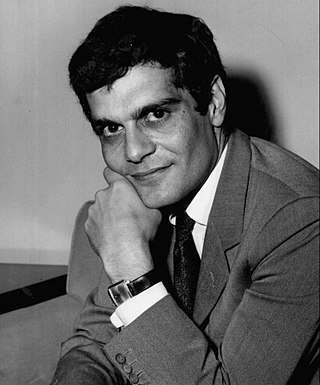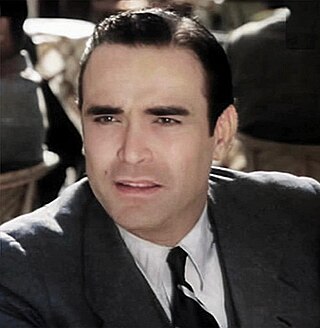Cleopatra was the last active Ptolemaic ruler of Egypt before it became a Roman province.

Soad Muhammad Kamal Hosny was an Egyptian actress born in Cairo. She was known as the "Cinderella of Egyptian cinema" and one of the most influential actresses in the Middle East and the Arab world. She rose to stardom at the end of the 1950s, performing in more than 83 films between 1959 and 1991 with nine films in the greatest 100 films in the history of Egyptian cinema. A majority of her films were shot in the 1960s and 1970s. Her final screen appearance was in the 1991 film,The Shepherd and the Women, directed by her ex-husband Ali Badrakhan.

Muhammad Anwar es-Sadat was an Egyptian politician and military officer who served as the third president of Egypt, from 15 October 1970 until his assassination by fundamentalist army officers on 6 October 1981. Sadat was a senior member of the Free Officers who overthrew King Farouk in the Egyptian Revolution of 1952, and a close confidant of President Gamal Abdel Nasser, under whom he served as Vice President twice and whom he succeeded as president in 1970. In 1978, Sadat and Menachem Begin, Prime Minister of Israel, signed a peace treaty in cooperation with United States President Jimmy Carter, for which they were recognized with the Nobel Peace Prize.
The year 1970 in film involved some significant events.

The War of Attrition involved fighting between Israel and Egypt, Jordan, the Palestine Liberation Organisation (PLO) and their allies from 1967 to 1970.

Joseph is an important Hebrew figure in the Bible's Book of Genesis and in the Quran. He was the first of the two sons of Jacob and Rachel. He is the founder of the Israelite Tribe of Joseph. His story functions as an explanation for Israel's residence in Egypt. He is the favourite son of the patriarch Jacob, and his jealous brothers sell him into slavery in Egypt, where he eventually ends up incarcerated. After correctly interpreting the dreams of Pharaoh, however, he rises to second-in-command in Egypt and saves Egypt during a famine. Jacob's family travels to Egypt to escape the famine, and it is through him that they are given leave to settle in the Land of Goshen.

Omar Sharif was an Egyptian actor, generally regarded as one of his country's greatest male film stars. He began his career in his native country in the 1950s. He is best known for his appearances in American, British, French, and Italian productions. His career encompassed over 100 films spanning 50 years, and brought him many accolades including three Golden Globe Awards and a César Award for Best Actor.

The Prince of Egypt is a 1998 American animated musical drama film produced by DreamWorks Animation and released by DreamWorks Pictures. The second feature film from DreamWorks and the first to be traditionally animated, it is an adaptation of the Book of Exodus and follows the life of Moses from being a prince of Egypt to a prophet chosen by God to carry out his ultimate destiny of leading the Hebrews out of Egypt. The film was directed by Brenda Chapman, Steve Hickner, and Simon Wells, and produced by Jeffrey Katzenberg, Penney Finkelman Cox, and Sandra Rabins, from a screenplay written by Philip LaZebnik. It features songs written by Stephen Schwartz and a score composed by Hans Zimmer. The film stars the voices of Val Kilmer, Ralph Fiennes, Michelle Pfeiffer, Sandra Bullock, Jeff Goldblum, Danny Glover, Patrick Stewart, Helen Mirren, Steve Martin, and Martin Short.

Adel Emam is an Egyptian film, television, and stage actor. He is primarily a comedian, but he has starred in more serious works and, combined comedy with romance especially in his earlier secondary roles in films such as My Wife, the Director General, My Wife's Dignity, My Wife's Goblin and Virgo, all films starring Salah Zulfikar.

Tanta is a city in Egypt. With a population of 658,798, as of 2018, it is the country's fifth most populous city. Tanta is located between Cairo and Alexandria: 94 km (58 mi) north of Cairo and 130 km (81 mi) southeast of Alexandria. The capital of Gharbia Governorate, it is a center for the cotton-ginning industry.

"Walk Like an Egyptian" is a song by American band the Bangles. It was released in September 1986 as the third single from their second studio album, Different Light (1986). It was the band's first number-one single, being certified gold by the Recording Industry Association of America (RIAA), and was ranked Billboard's number-one song of 1987.
Middle Eastern cinema collectively refers to the film industries of West Asia and part of North Africa. By definition, it encompasses the film industries of Egypt, Iran, Bahrain, Iraq, Israel, Jordan, Kuwait, Lebanon, Palestine, Oman, Qatar, Saudi Arabia, Syria, United Arab Emirates, and Yemen. As such, the film industries of these countries are also part of the cinema of Asia, or in the case of Egypt, Africa.
The following is a list of Egyptian films. The year order is split by decade. For an alphabetical list of films currently on Wikipedia, see Category:Egyptian films.

The cinema of Egypt refers to the flourishing film industry based in Cairo, sometimes also referred to as Hollywood of the East or Hollywood on the Nile. Since 1976, the capital has held the annual Cairo International Film Festival, which has been accredited by the FIAPF. There are an additional 12 festivals. Of the more than 4,000 short and feature-length films made in MENA region since 1908, more than three-quarters were Egyptian films. Egyptian films are typically spoken in the Egyptian Arabic dialect.

Salah El-Din Ahmed Mourad Zulfikar was an Egyptian actor and film producer. He started his career as a police officer in the Egyptian National Police, before becoming an actor in 1956. He is regarded as one of the most influential actors in the history of the Egyptian film industry. Zulfikar had roles in more than a hundred feature films in multiple genres during a 37-year career, mostly as the leading actor. He was one of the most dominant leading men in Egyptian cinema.
Kamal El Sheikh was an Egyptian film director. He directed 28 films between 1952 and 1987, with eight of them in the Top 100 Egyptian films list. He was known in the fifties and early sixties as "Hitchcock of Egypt" because of his influence on the cinema of the well-known British director.
Fatin Abdel Wahab was an Egyptian film director. He directed 52 films between 1949 and 1970. His 1961 film Wife Number 13 was entered into the 12th Berlin International Film Festival. His 1965 film Driven from Paradise was entered into the 4th Moscow International Film Festival.

Mahmoud Zulfikar was an Egyptian film director, producer, screenwriter, and actor. He was a major figure in Egyptian film industry.













